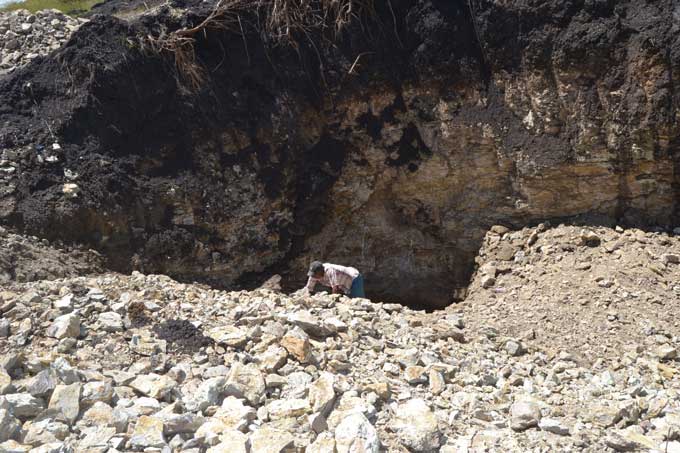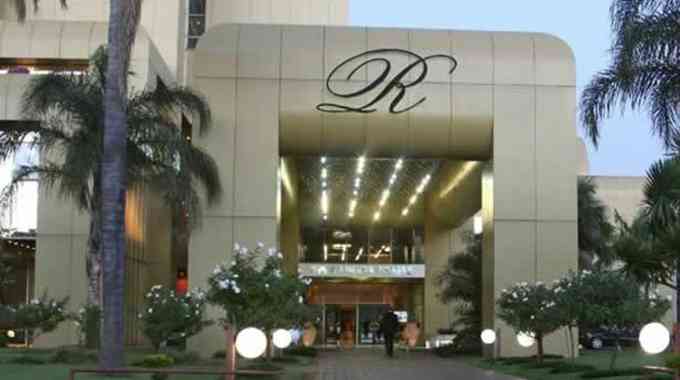
BY BRENNA MATENDERE
An influx of Chinese chrome smelters in Gweru’s light industrial areas has emerged as one of the biggest threat to the Midlands capital’s road infrastructure as trucks that carry raw materials routinely flout load limits leading to serious damage on the city’s roads, investigations have revealed.
Earlier investigations by The Standard in collaboration with the Information Development Trust (IDT), a non-profit organisation that supports journalists in Zimbabwe and southern Africa to investigate issues of corruption in the public sector and bad governance, revealed that the scramble for chrome, especially by Chinese miners had left a trail of destruction on the environment in many parts of the Midlands.
The chrome mining activities have caused irreparable damage to the environment especially in rural parts of the Midlands province such as Shurugwi, Zvishavane and Mberengwa.
Some of the pits were abandoned as far back as 20 years ago and this has put the lives of villagers and their livestock in danger.
A follow-up investigation has revealed that the damage to infrastructure and the environment also extends to urban areas such as Gweru where trucks transporting chrome ore to smelters are blamed for the serious degradation of some of the city’s roads.
Some of the major Chinese companies with chrome smelting plants in Gweru’s light industrial areas are Jinan, Xi Yu and Almed.
From the smelting plants, the companies transport the metal in 12 tonne container trucks to Beira in Mozambique for shipment to markets mainly in China and Singapore.
- Chamisa under fire over US$120K donation
- Mavhunga puts DeMbare into Chibuku quarterfinals
- Pension funds bet on Cabora Bassa oilfields
- Councils defy govt fire tender directive
Keep Reading
This publication was shown extensive damages on Gweru’s Bristol Road, which city authorities’ blame on trucks transporting chrome ore to Jinan, Almed and XI YU smelting plants, among other operations.
The road is littered with deep potholes and motorists struggle to navigate the route.
Council was recently forced to repair a section of Bristol Road, now known as PamaChina, following an outcry from motorists.
The damage on traffic circles on the Gweru- Shurugwi road have also been blamed on the heavy trucks that carry loads beyond the statutory limits.
Trust Chinini, the Gweru City Council’s environment, works and town planning committee chairperson, said the Chinese chrome smelters were behind most of the damage to the city’s roads.
“The by-laws for Gweru say that the maximum tonnage for trucks that use roads in the (central business district) and those that lead to residential areas is seven tonnes,” Chinini told The Standard.
“There are clear sign posts on the roads, which carry this information to road users.
“However, the Chinese are using trucks with loads of between 20 to 30 tonnes. It is a cause for concern.
“As the environment committee we have talked about this at our caucus meetings.
“These are not documented.
“However, we are planning to come up with a way forward so that there is a resolution on that matter. We want them to repair the roads.”
He said the local authority had previously repaired the affected roads, only for the Chinese companies to damage them in a matter of days.
“The problem is that if we repair the roads today, in a few days’ time they will have been damaged again,” Chinini added.
“We are worried as Gweru because of the conduct of Chinese companies on our roads.
“The worst affected road is the one that comes from Shurugwi going up to Bristol Road leading to their smelting companies”.
Gweru Residents and Rate Payers Association director Cornellia Selipiwe said money that should be going towards service delivery was now being spent on fixing roads being damaged by the Chinese companies.
“There are so many roads that have been damaged by the Chinese trucks in Gweru,” Selipiwe said.
“We are worried as residents that money, which must go towards service delivery like water supplies, sewer reticulation and collection of garbage, will now be gobbled by rehabilitation of the roads.
“Our water pumping plant at Gwenhoro Dam needs major refurbishments and that huge amount of money now going towards repairs of roads damaged by the Chinese could have been used there seeing that council has financial constraints.”
Council spokesperson Vimbai Chingwaramuse said the local authority would this year spend $169 million on repairing roads damaged by the Chinese companies.
“This year we have a budget of $169 million to deal with the menace,” Chingwaramuse said.
“So this comes at a huge cost, thus affecting service delivery greatly.”
She said the local authority had resolved to stop absorbing the cost of repairing the damaged roads and the Chinese companies would in future be forced to pick the bill.
“We are going to invoke sections of the Town Planning Act to ensure they repair and adopt the roads for maintenance,” Chingwaramuse added.
“It’s mainly the roads that lead to the light industries.”
Selipiwe said council must come up with policies to ensure that companies whose operations cause damage to the city’s infrastructure are forced to contribute towards the necessary repairs.
“We expect corporate social responsibility from the Chinese companies, but sadly nothing has come out from them,” he said.
“We implore the city council to engage them seriously.”
Kudakwashe Titus Chitakure, a human resources officer for Xi Yu who is based in Gweru, said they were not allowed to talk to journalists.
Several attempts to get a comment from Jinan and Almed officials in Gweru were unsuccessful as officials ignored messages.
Zimbabwe National Roads Administration spokesperson Tendai Mugabe said although they were aware of the damage caused by overloaded trucks on Gweru’s roads, there was nothing they could do because the issue was outside their mandate.
“Yes we are aware, but our mandate is only limited to funding of road authorities to do road rehabilitation and maintenance,” Mugabe said.
Transport minister Felix Mhona said “restricted tonnage of goods must always be observed on our roads.”
Mhona, however, could not comment specifically about the Chinese chrome smelters in Gweru, saying he was not familiar with the issue.
A 2013 report by Parliament’s portfolio committee on mines and energy that investigated operations of Chinese chrome mining companies along the Great Dyke said most of them were in the habit of violating the law.
The committee said the Chinese companies had an “attitude of being untouchable and could operate above the law.”
“The Chinese created the impression within the community and in some government institutions that they were protected by someone in a very high office in government,” the report said.
“As a result EMA (the Environment Management Authority), the local authorities and the community were powerless to enforce or demand compliance of environmental and mining regulations.”
EMA admitted that the scramble for chrome had led to serious environmental degradation in the Midlands.
EMA said the unsustainable chrome mining along the Great Dyke was mainly driven by the lifting of the ban on chrome exports, rising prices for the mineral on international markets and the increased number of chrome washing and smelting plants in the Midlands.
Chinese companies, especially in mining, have of late come under fire for disregarding local regulations leading to extensive damage to the environment amid accusations that authorities pay a blind eye to the violations.
On February 18, the Chamber of Chinese Enterprises in Zimbabwe (CCEZ) issued an appeal to investors from the Asian country “to protect Zimbabwe’s natural environment and historical and cultural heritage.”
CCEZ was responding to mounting complaints about some Chinese mining companies in Zimbabwe, who are accused of displacing locals and encroaching into ecologically sensitive areas like game reserves, to set up mining operations.










